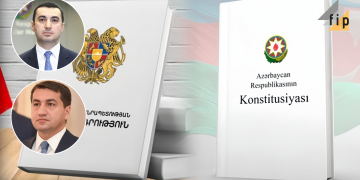On November 2, during the discussion of the 2023 budget in the National Assembly, RA Prime Minister Nikol Pashinyan stated that there is a deficit of cement, stone and other building materials in the country.
He reminded that back in time a few local companies were granted a certain privilege in the field of cement production, as a result of which he only recently, in his words, “surprisingly found out” that when the market clearly has a demand for cement, they “continue to live their normal lives.”
“They expect that the government should still help them when the market clearly needs cement. …We must be very careful when granting privileges, of course, it must be analyzed, I don’t want to jump into conclusions, but I reiterate, we should support recovery and development,” he said.
It is noteworthy that before addressing this issue, Pashinyan stated that the greatest role of the government should be not to hinder the economy so that it ensures growth. “Moreover, this theoretical thesis is constantly practiced,” he said.
Fact Investigation Platform has summarized when and in what conditions the local cement producers received this privilege.
In 2019, a state duty was imposed on the import of cement helping Tsarukyan’s company
In April 2019, the topic of cement was one of the top domestic political issues. The “Prosperous Armenia” faction of the National Assembly of the 7th convocation demanded the government to protect the interests of the local producer, as the cement imported from Iran was several times cheaper than the local product.
The government, meeting the demand of the faction, presented a draft law to the National Assembly, which proposed to set a duty of AMD 22 thousand for the import of one ton of cement.
In the National Assembly, they tried to balance this decision of the government, some deputies expressed their opposition saying that the importers would face a problem and construction would become more expensive.
As a result, the National Assembly adopted the draft presented by the government in the first reading.
Despite the high import duty, this decision was not to the liking of the “Prosperous Armenia” faction, and the PAP voted against the draft along with the opposition “Bright Armenia” faction at the time. The “Bright Armenia” faction voted against seeing a conflict of interests, while the PAP voted against because the head of the faction, Gagik Tsarukyan, demanded to set a customs duty for the import of cement raw material, clinker as well.
It should be noted that the “Araratcement” plant which produces 70-80 percent of the cement used in the country, was one of Gagik Tsarukyan’s businesses entrusted to fiduciary management at that time.
This decision of the National Assembly was followed by the strikes of the employees of the “Araratcement” plant, since they had received notices from the management that they would be unemployed after two months.
Despite the complaints, the Parliament decided to set the state duty on cement import at AMD 14,000 drams instead of AMD 22,000, and not to impose a state duty on clinker. Also, it was decided to set a period of validity on the state duty applied to cement – one year, in order to understand how the market changes within a year because the issue required studies.
This regulation was maintained until December 31, 2020. In the extraordinary session of the National Assembly, it was planned to extend the “14 thousand and 0 AMD regime” for another 6 months, but not enough votes were collected and the draft did not pass.
In order to alleviate the grievances of cement producers, the government decided on January 27, 2021 to ban the import of cement to Armenia for six months, then proposed to set a duty of AMD 25 thousand for the import of 1 ton of cement, and AMD 9 thousand for the import of clinker.
The NA Standing Committee on Economic Affairs gave a negative conclusion to the proposal arguing that it would lead to monopolization of the market. As a result, the law was adopted to leave the established price for the import of cement unchanged – at AMD 14 thousand drams, and a set a state duty of AMD 2000 for the import of cement raw materials – clinker.
It should be noted that during the discussions, the quality of cement was also touched upon, including stating that such a decision was made in order for local producers to improve the quality of cement. Meanwhile, there seemed to be no change in quality during this period. In September of this year, the Urban Development Committee even convened a session on that issue.
The issue came on the agenda this year as well, when the volume of construction was increasing every month, and the price of cement was increasing. In 2022, on the initiative of the members of the National Assembly, a law was discussed and approved as per which the duty on imported cement was reduced by AMD 5,000 (AMD 9,000 per ton was set), and the duty on imported clinker was eliminated. It was recorded that the price of cement in Armenia increased by 25 percent in just one year.
After the adoption of the law, when already a cement deficit was noted in the country, Gegham Gevorgyan, the chairman of the State Commission for the Protection of Economic Competition, reported that the Commission studied the cement market and there is a concern that the deficit may also be created for an artificial purpose, and the price increase may be based on this.
And on November 1 of this year, during the discussion of the issue in the National Assembly, it was stated that “Araratcement” and “Hrazdan Cement” have reduced production volumes. “Based on preliminary indicators, we have recorded the following situation, that one of the companies, Hrazdan Cement, has significantly reduced its realization volumes, from 26,000 tons to 4,000 tons compared to the previous month. A certain decrease in realization volumes, about 7-8 percent, was also recorded at the company in a dominant position, “Araratcement.” We have also recorded a slight increase in the volume of imported cement due to the change in the law on duty, but the volume of import has not yet increased significantly. In other words, the deficit is a fact, it is clearly recorded in the market. Whether it was artificially created or a it is natural deficit, the commission has not come to any conclusion as of yet,” said Hayk Karapetyan, a member of CPC.
A picture of cement production and import in figures
During the period of 2019-2021, when cement import duty was imposed on the grounds of protecting the local producer, domestic production also increased due to the increase in construction in the market, and in parallel, the cement prices also increased. The increase in cement production was ensure by the main 2 producers, “Araratcement” and “Hrazdan Cement.”
According to the data of the State Statistics Committee, 590.5 thousand tons of cement were produced in 2019, 715.1 thousand tons in 2020, and 744.5 thousand tons of cement were produced in 2021.
Production increased by 26% in two years.
The import of cement reduced twice, by 101%. While in 2019, 298 thousand tons were imported from Iran to Armenia, in 2020 it was 230 thousand tons, and in 2021 – around 148 thousand tons.
The import of cement raw material, clinker, from Iran was 32 thousand tons in 2019, 20 thousand tons in 2020, 26 thousand tons in 2021.
In 3 years, the price of cement has increased by about 35 percent
If cement could be purchased for 40,000 drams in 2019, today the price of 1 ton of cement has increased by about 35 percent. “Araratcement” plant reported to FIP.am that one ton is currently being sold for AMD 54,000, while “Hrazdan Cement” reported that they were selling for AMD53,000. It is noteworthy that the product reaches the consumer at higher prices. Cement can be purchased from construction material stores for AMD 64,000 per ton, and the price of Iranian cement reaches around AMD 70,000.
In the conditions of this deficit, after the reduction of the import duty, Iranian cement is offered in the market in a non-traditional way. For instance, on the List.am website, they offer a ton of Iranian cement for AMD 60-65,000 in case of wholesale purchase.
Nelly Lazaryan

 FACTOMETER
FACTOMETER










